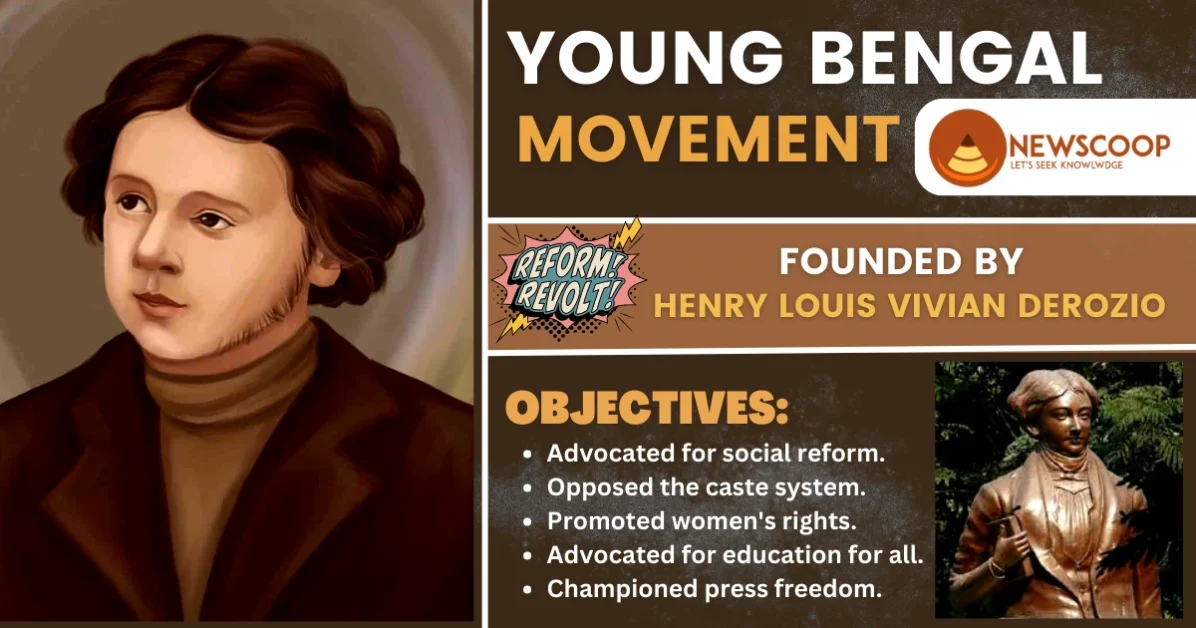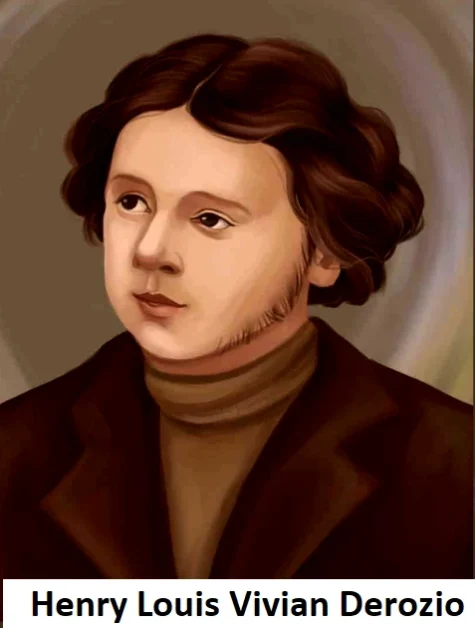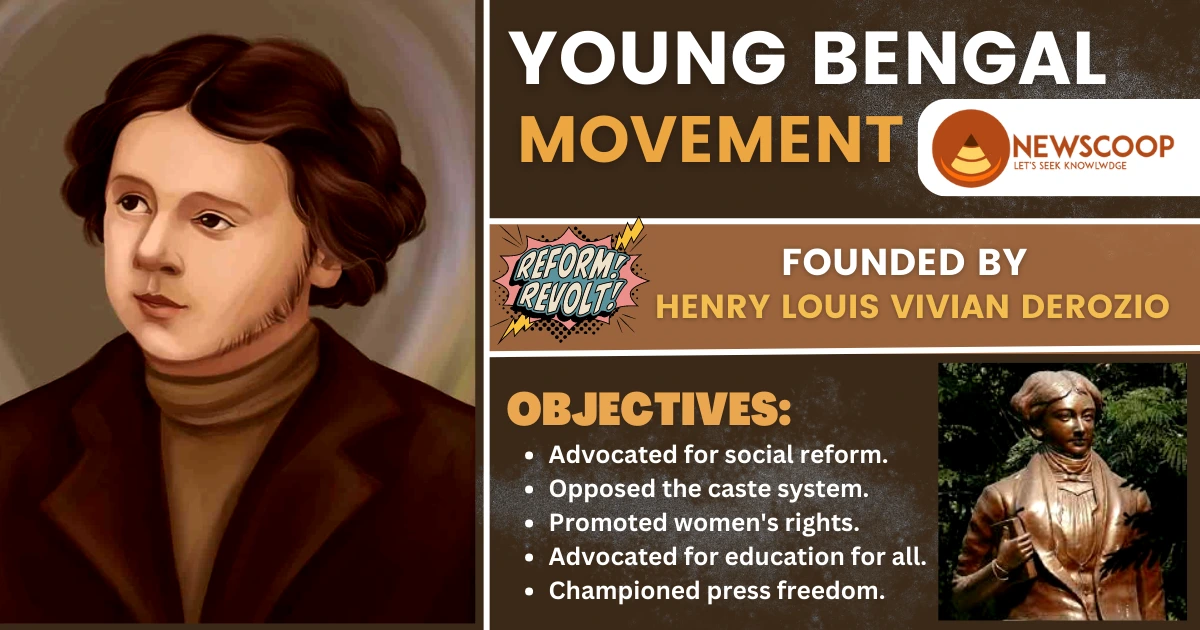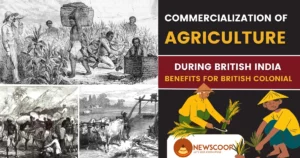In the early 19th century, the Indian subcontinent was undergoing profound socio-cultural and political transformations under British colonial rule. During this time, a vibrant intellectual movement known as the “Young Bengal Movement” emerged in the heart of Calcutta (now Kolkata).
This movement, led by a group of brilliant and radical young thinkers, marked a renaissance of thought in Bengal. In this article, we explore the origins, key figures, ideologies, and lasting impact of the Young Bengal Movement for the UPSC Examination.
Young Bengal Movement
The Young Bengal Movement took root in the 1820s and 1830s as a response to the prevalent socio-cultural and religious conservatism of the time. It was primarily centered around the Hindu College in Calcutta, where young minds came together to challenge orthodoxy, superstition, and British colonialism.
Objectives
The following are the objectives of the Young Bengal Movement:
- Promoting radical ideas through education and debates in Literature, History, Philosophy, and Science.
- Unfolding an intellectual revolution among young students.
- Propounding liberal thinking and advocating for the end of social evils like child marriages, child labor, and the Sati practice.
- Promoting women’s education.
- Spreading concepts of the French Revolution: liberty, fraternity, and equality.
- Encouraging value-based and rational thinking through scientific-based information, opposing rote learning.
Founder of the Young Bengal Movement
Henry Louis Vivian Derozio is often considered the pioneer and inspirational figure behind the Young Bengal Movement. Derozio was a teacher at the Hindu College in Calcutta, where he inspired young minds to challenge traditional beliefs and embrace rationalism.
Moreover, his fiery lectures and writings played a crucial role in sparking the intellectual revolution that became the Young Bengal Movement.

Legacy & Impact
The Young Bengal Movement’s legacy is enduring:
- Education Reforms: The movement catalyzed the spread of Western education in Bengal, sowing the seeds for a new generation of enlightened thinkers.
- Social Awakening: The Young Bengal Movement laid the foundation for various social reform movements in India, addressing issues such as caste discrimination, women’s rights, and education for all.
- Cultural Renaissance: It rejuvenated Bengali literature and culture, paving the way for the Bengal Renaissance that produced luminaries like Rabindranath Tagore.
- Political Consciousness: The movement’s anti-colonial sentiments fostered political awareness, which would later contribute to India’s struggle for independence.
Henry Louis Vivian Derozio (1809-1831)
Henry Louis Vivian Derozio was a prominent Indian poet and educator of the 19th century, known for his contributions to the Young Bengal Movement and his pioneering efforts in promoting rationalism, social reform, and literature in India.
Henry Louis Vivian Derozio was born on April 18, 1809, in Calcutta (now Kolkata), West Bengal, during the British colonial era. His heritage was mixed, reflecting the diverse cultural influences of the time.
Derozio was of Indo-Portuguese descent, with his father hailing from a Portuguese background, and his mother having Indo-Anglo roots.
He began his early education at the Dhuramtolla Academy in Calcutta, and later, he pursued higher education at Hindu College, a renowned and prestigious institution in the city.
At Hindu College, Derozio became a teacher and mentor to a group of students who would become the core of the Young Bengal Movement. This movement aimed to promote rationalism, question orthodoxies, and advocate for social reform.
Derozio’s teaching methods were unconventional for the time. He encouraged critical thinking, free expression, and the pursuit of knowledge. His ideas often challenged traditional religious and societal norms.

Henry Louis Vivian Derozio’s Social and Political Activism
- Advocated for social reform.
- Opposed the caste system.
- Promoted women’s rights.
- Advocated for education for all.
- Championed press freedom.
- Contributed to the Bengal Renaissance.
- Led public protests on various issues.
- Fought for the rights of marginalized groups.
- Influenced religious conversion through his beliefs.
- Used education and public discourse for change.
Legacy of Derozio
Derozio is recognized as one of India’s earliest nationalist poets. His poems, particularly “To India – My Native Land,” continue to be celebrated for their patriotic and inspirational themes.
In addition, his progressive teaching methods and emphasis on rationalism left a lasting impact on education in India.
Moreover, Derozio’s advocacy for social reform and his fight against caste discrimination and oppression contributed to the broader social and cultural changes of the 19th century in India.
Henry Louis Vivian Derozio’s life and work remain an integral part of India’s literary and social history, and he is remembered as a key figure in the intellectual awakening of 19th-century Bengal.
Conclusion
In conclusion, the Young Bengal Movement was a remarkable chapter in India’s intellectual and cultural history. It ignited a spark of rationalism, social reform, and political consciousness that continues to shape the nation’s identity and progress to this day.
Moreover, the legacy of these young radicals, who dared to question the status quo, stands as a testament to the enduring power of ideas and the potential for change through intellectual ferment and social activism.
Thank You!
Related Links:





